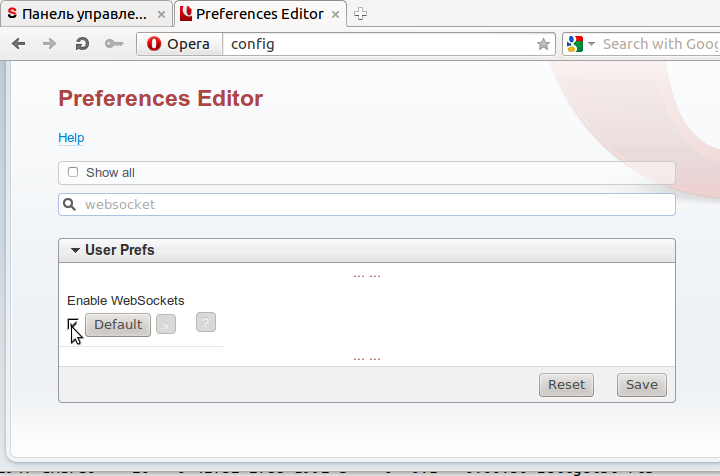Cloud news
Table of contents:
The time has come to fix this problem. A component called selecon-web (this is not illiteracy, it is short for Selectel Console) was rewritten to haskell, as a result of which we significantly reduced processor consumption, and users improved console speed. Note that the actual output speed remains the same (since the console is still a serial port, its output speed is fixed, but the console opening time and the time for which the letter from the virtual machine port appeared in the client’s browser).
We made it multithreaded (goodbye, GIL), used the Haskell websockets instead of the Python gevent-socketIO, and, lo and behold, the 13th Chrome (and all the subsequent ones) earned.
But IE9 does not support web sockets. Sorry, we won’t dance with flash simulations anymore. Use Opera, Chrome, FF, Safari, IEtab ... Perhaps it works in IE10, but we don’t have it live to test it.
By the way, to the question of how to enable web sockets.
For Chrome and Safari, web sockets are enabled by default.
For Firefox new versions of websockets are included, for older instructions are similar to Opera (or update).
For Opera: type in about: config in the new tab; in the options tab, type websocket in the search field, check the box, restart the browser.
Below picture:

Since CentOS is a free assembly of RHEL 5.8, the most complete list of changes can be seen here: docs.redhat.com/docs/en-US/Red_Hat_Enterprise_Linux/5/html/5.8_Release_Notes/index.html
From what seemed to me most noticeable - commands reload for iptables, inclusion of iotop in the distribution package, support for ext4 file system resizing with the -r option of lvresize.
Symptoms: when a disk is connected in “auto” mode, the disk number (and the letter with which it appeared in the system) increased by one each time. Connecting with a "lower" number was not possible. When the limit on the number of disks was reached, the message Connection Limit Reached was returned.
The problem is fixed, the disks can be connected as many times as you like with any available numbers, and the “auto” will assign the smallest possible disk number.
- Console update
- CentOS 5.8
- Correction of an error with connection of disks
Console
After we launched the console, almost a year passed. For this year, chrome has been updated, changed the version of websockets. And the console remained operational only in Firefox and Opera, offending at the same time Mac users who have Safari as their main browser (inside Safari the same “engine” as in Chrome is WebKit). Plus, the console was not very fast.The time has come to fix this problem. A component called selecon-web (this is not illiteracy, it is short for Selectel Console) was rewritten to haskell, as a result of which we significantly reduced processor consumption, and users improved console speed. Note that the actual output speed remains the same (since the console is still a serial port, its output speed is fixed, but the console opening time and the time for which the letter from the virtual machine port appeared in the client’s browser).
We made it multithreaded (goodbye, GIL), used the Haskell websockets instead of the Python gevent-socketIO, and, lo and behold, the 13th Chrome (and all the subsequent ones) earned.
But IE9 does not support web sockets. Sorry, we won’t dance with flash simulations anymore. Use Opera, Chrome, FF, Safari, IEtab ... Perhaps it works in IE10, but we don’t have it live to test it.
By the way, to the question of how to enable web sockets.
For Chrome and Safari, web sockets are enabled by default.
For Firefox new versions of websockets are included, for older instructions are similar to Opera (or update).
For Opera: type in about: config in the new tab; in the options tab, type websocket in the search field, check the box, restart the browser.
Below picture:

CentOS 5.8
Recently, the CentOS 5 update has been released and it is already waiting in the customer product. 5.7 remains available. Existing users will be able to get CentOS 5.8 out of 5.7 using the yum update command.Since CentOS is a free assembly of RHEL 5.8, the most complete list of changes can be seen here: docs.redhat.com/docs/en-US/Red_Hat_Enterprise_Linux/5/html/5.8_Release_Notes/index.html
From what seemed to me most noticeable - commands reload for iptables, inclusion of iotop in the distribution package, support for ext4 file system resizing with the -r option of lvresize.
Drive connection
Annoying negligence, which led to the fact that the disk could be connected "once in the life of the machine" is eliminated.Symptoms: when a disk is connected in “auto” mode, the disk number (and the letter with which it appeared in the system) increased by one each time. Connecting with a "lower" number was not possible. When the limit on the number of disks was reached, the message Connection Limit Reached was returned.
The problem is fixed, the disks can be connected as many times as you like with any available numbers, and the “auto” will assign the smallest possible disk number.
